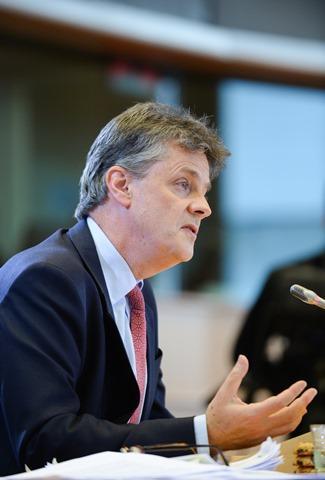Jonathan Hill’s Plan to Rebalance Financial Services Regulation
Since taking office in November, the former U.K. politician has emphasized the need to re-assess the post-crisis regulatory framework for financial services.
SINCE THE FINANCIAL CRISIS in 2008, governments in all the major financial centers have been focused on repairing the damage and building better protections against another crisis. Europe is about to change direction, however. Economic growth is now the main focus in Brussels, and there is a new emphasis on easing the regulatory burden on the financial sector.
This is not to say that Europe is abandoning the G20 reforms or reversing course on the legislative initiatives approved since the crisis. In fact, there are still several more of those initiatives in the pipeline, notably a proposal for clearinghouse recovery and resolution. But there is a new tone in Brussels and a different set of priorities, and nowhere is that more clear than the statements and speeches of Jonathan Hill, the member of the European Commission who has responsibility for the financial sector.
Since taking office in November, Hill has embarked on a campaign to reorient financial services policy so that it serves the broader purpose of creating jobs and growth. At the top of his agenda is achieving Capital Markets Union, one of the flagship initiatives of the new European Commission. The goal is to knock down the barriers to a true single market for capital in Europe so that investment can flow more freely and more funding becomes available for businesses.
Hill also has announced his intention to review the blizzard of legislation and regulation promulgated over the last several years and assess the cumulative impact. He has indicated that this review may lead to recommendations to “adapt the framework” of regulation to ease the burden on the financial sector, a move that will require political support in the European Parliament and among member states.
Implications for Derivatives
These two broad initiatives–achieving Capital Markets Union and reassessing the post-crisis reforms–have important implications for derivatives markets. Even though the primary focus is not on derivatives, there may be indirect benefits from the change in emphasis from stability to growth. These could include, for example, a more cautious approach to the task of drafting new rules, a drive to promote greater cross-border flows of capital, and perhaps most importantly, a willingness to listen to market participants and address their concerns, even if that means revising some of the rules that were only recently put into effect.
There is one other theme on Hill’s agenda that has a significant bearing on the derivatives markets, and that is the European Union’s approach to regulating cross-border transactions. Hill inherited a dispute with the U.S. over the regulation of clearinghouses that has proven to be difficult to resolve. This dispute is centered on the difference in margin methodologies, which is holding up a determination by the European Commission that U.S. regulation of clearinghouses is “equivalent” to EU regulation of clearinghouses.
Despite high-level talks in Washington in February as well as a meeting with Commodity Futures Trading Commission Chairman Tim Massad in May, the two sides have not been able to resolve their differences. In fact, the deadline for action has been extended for another six months, the third time this has happened, even as European Commission has granted equivalence determinations to four other countries–Australia, Hong Kong, Japan and Singapore.
Less Is More
Although Hill comes from the U.K., his views are not out of line with the rest of the new Commission. Indeed the new approach comes all the way from the top.
“I think there is a growing consensus that it makes sense to step back and ask ourselves whether we managed to get everything exactly right all of the time.”
Jonathan Hill
European Commission
When Jean-Claude Juncker, the President of the European Commission, came into office last fall, one of the first things he did was to announce a different approach to the process for developing and proposing legislation. The veteran politician, who served as the prime minister of Luxembourg from 1995 to 2013, called on the Commission to limit the number of new proposals and increase the amount of time spent reviewing the ones that are already in place. Juncker said the goal would be to be “bigger and more ambitious on big things and smaller and more modest on small things.”
Juncker also reorganized the structure of the Commission, appointing a first vice president with the power to block legislative proposals and steer away from over-regulation, and he surprised many observers by assigning the financial services portfolio to the U.K.’s representative in the Commission.
In an April speech in Brussels, Hill explained what the new approach means for financial services. He said he expects less new legislation in the future and more focus on “bedding-in” the recent reforms.
“Over the past five years, we had to legislate at speed while the fires of a crisis were still burning all around. What we did—what you did—made the financial system stronger,” Hill told the audience, which included officials from the Commission and the European Central Bank.
“But now I think there is a growing consensus that it makes sense to step back and ask ourselves whether we managed to get everything exactly right all of the time. Not to question the fundamentals of the approach but to take a look at the combined effect of our legislation and ask ourselves whether we have always achieved the correct balance between stability and growth.”
Hill went on to say that Europe needs to be open to changing the rules where they stand in the way of economic growth. “And if the evidence does show that some of the rules are not proportionate to the risks posed by different types of institutions, or that there have been unintended consequences, then we should have the confidence to adapt the framework,” he said. “Yes we need financial stability because that is the basis for sustainable growth. But we also need to recognize something else: today, the greatest threat we face to financial stability is a lack of jobs and growth.”
Will She Stay or Will She Go?
One complicating factor is the U.K.’s conflicted relationship with the European Union. U.K. Prime Minister David Cameron, hoping to gain support from Euro skeptics in his party, made a pledge during his re-election campaign to hold a referendum on whether the U.K. should pull out of the European Union. His victory on May 7 means that this issue will now be put to U.K. voters at some point between now and the end of 2017.
No member state has ever left the Union, but the idea has enjoyed a certain popularity among U.K. voters. A Financial Times poll conducted in April found that respondents were split almost evenly on the issue.
“We need financial stability because that is the basis for sustainable growth. But we also need to recognize something else: today, the greatest threat we face to financial stability is a lack of jobs and growth.”
Jonathan Hill
European Commission
Political experts expect support for the status quo to grow as the referendum draws closer and say that he possibility of a British exit is quite remote. Nevertheless, the campaign around the issue will cast a shadow over Britain’s relationship with Europe and may put Hill in a difficult position. Hill spent the first part of his political career in the 1980s and 1990s working in the Conservative Party and came back into politics in 2010 to work in Cameron’s government. He has made it clear that in his current role he is acting in the interests of Europe as a whole, but given his close ties to Cameron and his background in the Conservative Party, he will face scrutiny if he is seen to be pushing policies that disproportionately benefit the U.K., and the City of London in particular.
That highlights the challenges Hill faces in persuading European leaders to support “adaptations” to the regulatory framework. This is where the legislative review process will be critical; if the process provides evidence of harmful impact on businesses and the economy, he will be in a better position to persuade politicians in Brussels that a new approach is needed.
One advantage for Hill is that he has plenty of experience in the art of building consensus. In 2010 Cameron arranged for him to join the House of Lords, and in January 2013 he became leader of the House of Lords, which in effect meant coordinating the party’s legislative business in the upper house of Parliament. By all accounts he was effective at gathering support across party lines for Cameron’s legislative priorities.
A Fresh Look at EMIR
One of the first pieces of legislation that Hill will review is the European Market Infrastructure Regulation, which contains the regulatory framework for the mandatory clearing requirements that will be coming into force over the next year or so. The Commission has begun gathering input from stakeholders in four main areas:
- Requirements for Central Counterparties
- Requirements for Non-Financial Corporations
- Clearing and Risk Mitigation Requirements
- Trade Repositories and Trade Reporting Requirements
Among the questions that the Commission is asking is whether the cost of regulation is impacting hedging activity, and whether customers are ready for the implementation of mandatory clearing. The Commission is also looking at the options that EMIR creates for segregating customer funds, asking whether these are “viable” from a cost perspective. This echoes a concern raised by clearing firms that EMIR provides too many options, leading to excessive complexity and cost.
It is worth noting that the Commission already has indicated a willingness to rethink its approach on certain issues. In February the Commission issued a report recommending that pension funds receive a two-year exemption from central clearing requirements. The Commission recognized that meeting margin requirements would be particularly burdensome for pension funds because of the way their business model operates and encouraged clearinghouses to continue working on technical solutions.
As Hill said when the report was issued in February, the key is making the regulations proportionate to the risks, and taking the time to get that right. “Today’s report sets out a number of potential ways to facilitate central clearing for pension funds,” he said. “But none of them is straightforward and it is sensible to take more time to develop a solution which is proportionate.”
JONATHAN HILL IN HIS OWN WORDS
Excerpt from a speech given on March 24 to the European Parliament’s Economic and Monetary Affairs Committee in Brussels.
LAST MONTH I went to the U.S. and am glad to say that in the area of financial regulation, the U.S. and EU agree more often than we disagree. But we still sometimes face situations where we are forced to scramble for last-minute fixes, as has been the case in the negotiation with the CFTC over cross-border derivatives. We don’t need to have exactly the same rules–but it would be helpful if we had a strong system of cooperation at the earliest stage of the regulatory process.
We think that better cooperation would allow us to entrench the leading role the EU and the U.S. play in setting global standards for financial regulation. By implementing international standards consistently, and by having close supervisory cooperation, the EU and the U.S. would be able to rely on each other’s rules–as long as they achieved the same outcomes.
At the same time, we would remove the frictions and costs that make life difficult for global businesses, and curtail opportunities to game the system. It would also deliver a better guarantee of financial stability, as emerging or potential problems would be spotted through supervisory cooperation and addressed in a more coordinated way.



